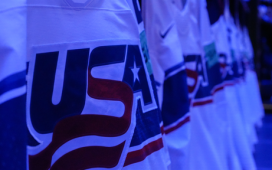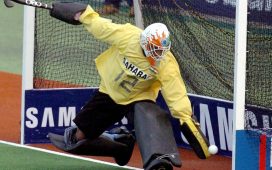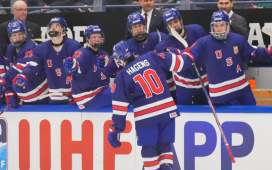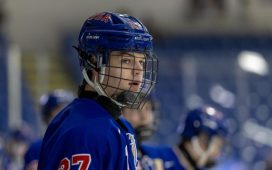Neither Pekka Rinne or Juuse Saros are getting the job done right now for Nashville, and both are struggling in different but equally costly ways. With no simple solution, how will the Predators proceed?

In The Hockey News’ annual season preview, three questions were asked of the Nashville Predators. One was whether the Predators’ quantity-over-quality approach down the middle would be beneficial. The next was whether Dante Fabbro could fill P.K. Subban’s sizeable shoes. The third was whether or not this would be the season we began to see the crease transition.
The answers? To the first, it’s yes, as the Predators boast one of the league’s highest-scoring attacks. To the second, it’s yes, as well. Fabbro has been a steady top-four defender – and that he’s outproducing Subban heading into the New Year is a welcome surprise. But it’s the latter, the one concerning the Predators’ goaltending, to which we do not yet have a solution. That’s because neither Pekka Rinne or Juuse Saros has been good enough to provide one. Matter of fact, both have been so second-rate that we might need to put the brakes on talk of Saros succeeding Rinne and substitute it for a discussion about Nashville looking elsewhere for teh answer.
Consider that following the Predators’ final game of the calendar year – a 6-4 defeat at the hands of the Pittsburgh Penguins – Nashville is all but certain to enter the Winter Classic with one of the weakest goaltending tandems in the NHL, Rinne and Saros combining to post an unsightly .892 SP. To contextualize the duo’s overall performance, the combined SP of the Predators’ one-two punch is, at the time of this writing, worse than that of the San Jose Sharks’ Martin Jones and Aaron Dell (.894 SP), worse than that of MacKenzie Blackwood and the since-demoted Cory Schneider (.896 SP) and even worse than that of Jimmy Howard and Jonathan Bernier (.893 SP), who have spent the season tending goal for what could be a historically bad Detroit Red Wings outfit.
But there’s something about the performance of the Predators’ netminders that makes it all the more difficult to wrap one’s head around. And it starts with 5-on-5 play, which seemingly paints an entirely different picture of Rinne despite his .894 SP at all strengths.
You see, as it turns out, Rinne’s numbers at five-a-side are quite sound. Of the 41 goaltenders to play at least 750 minutes at 5-on-5 this season, he ranks 14th with a .925 SP, 14th with a 3.46 goals-save above average per 60 minutes and his .872 high-danger SP is tops in the league. If you’re looking for a netminder with comparable numbers, look no further than the St. Louis Blues’ Jordan Binnington, who is following up a Stanley Cup-winning season with a campaign that has made him a Vezina Trophy candidate as we approach mid-season.
But for all of Rinne’s successes at five-a-side, he has been almost unthinkably poor shorthanded. To wit, of the 54 netminders who have played at least 50 minutes on the penalty kill this season, Rinne ranks dead-last with an atrocious .756 SP, and his numbers don’t get better from there. On high-danger attempts, he has a .533 SP, also last among the 54 goaltenders, and his minus-5.61 GSAA per 60 minutes is more than one and a half goals worse than any other keeper. And what’s confounding about Rinne’s shorthanded numbers is that there’s no valid reason as to why they’ve been so poor. Only 13 of the 54 goaltenders have faced a lower rate of shots against, only 13 have a lower expected goals against and there are only two who’ve faced a lower rate of high-danger shots against. Rinne has been protected and protected well, even if his performance suggests otherwise.
Here’s where things get tricky for the Predators, though. The simple solution would seem to be a swap, Saros replacing Rinne and taking over starting duty. After all, where Rinne has struggled, Saros has gotten the job done. True, his .866 SP while shorthanded is middle of the pack, but he has been perfect on high-danger opportunities and his minus-0.13 GSAA per 60 minutes is head-and-shoulders better than Rinne’s mark.
The problem is that Saros’ numbers at 5-on-5 are also head-and-shoulders worse than those of Rinne. Among the group of 41 goaltenders with 750 minutes played, Saros’ .898 SP at 5-on-5 puts him ahead of only Jones and the Edmonton Oilers’ Mike Smith. Saros’ GSAA per 60 minutes of minus–0.58 is again third-worst, better than Jones’ and Smith’s numbers. And Saros has been among the weakest goaltenders in the league when it comes to turning aside high-danger chances at five-a-side. Only the Minnesota Wild’s Devan Dubnyk (.733 SP) had posted a mark worse than Saros’ .740 SP.
And therein lies the problem. What the Predators possess are two goaltenders who are struggling in separate but equally costly ways, and we’re now through enough of the campaign that this seems less an aberration than it does a hard and harrowing reality. So, what’s the solution? Unless Nashville GM David Poile is about to unveil some proprietary goalie-melding technology, it appears there are only two options: the Predators can pray one of the two netminders works out the kinks or Poile is going to have to go out and find an answer. Neither is without risk.
When it comes to the latter, there’s no certainty that a fresh face will right the ship or perform all that much better than the current tandem. There’s also a matter of cost and options available, of which there are few and certainly fewer who could be had – and also be starting-goaltender quality – for cheap. And as it pertains to the former, deciding to ride the current Rinne-Saros duo comes complete with the potential for this campaign to be a complete letdown, a year sunk by subpar goaltending that sees a core that has yet to get the job done in the post-season grow one year older and one year closer to obsolescence.
How the Predators proceed is for Poile to decide, of course, but what is clear is that time is slowly running out for Nashville to make a choice. Each passing game, and each point dropped, only puts more pressure on Nashville to begin its ascent up the standings, and while only three points back of the second Western Conference wild-card spot, the Predators won’t be able to control their own fate and make up meaningful ground if they can’t stop the defensive bleeding. That comes down to getting the goaltending that was expected, but if it doesn’t arrive soon, we could be seeing the beginnings of an ultimately disappointing season in Nashville.
Want more in-depth features, analysis and an All-Access pass to the latest content? Subscribe to The Hockey News magazine.








